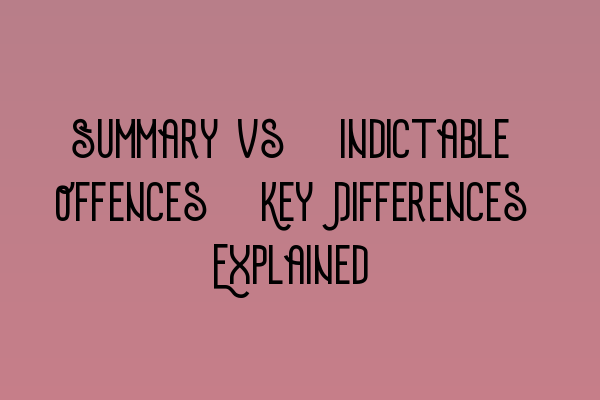Summary vs. Indictable Offences: Key Differences Explained
When it comes to categorizing crimes in the UK, the legal system draws a distinction between summary offences and indictable offences. Understanding these differences is crucial for both legal professionals and individuals involved in the criminal justice system. In this article, we will explore the key differences between summary and indictable offences to shed light on this often complex topic.
Summary Offences
Summary offences, also known as minor offences, are typically less serious in nature and carry a lower maximum penalty. These offences are usually tried in a Magistrates’ Court, where the majority of criminal cases are dealt with. Examples of summary offences include petty theft, public disorder offences, traffic violations, and minor assaults.
One of the primary characteristics of summary offences is that they are less complex and can be dealt with relatively swiftly. This allows for a streamlined legal process, ensuring that cases are resolved efficiently. However, it’s important to note that some summary offences can still have serious consequences, especially if they involve repeat offenses or high-value theft.
Being knowledgeable about summary offences is particularly important for legal professionals preparing for the SQE 1 exam. Understanding the intricacies of these offences can prove beneficial when dealing with clients, drafting legal documents, or presenting arguments in court.
Indictable Offences
On the other end of the spectrum, indictable offences are typically more serious in nature and carry a higher maximum penalty. These offences, also known as serious crimes, require a more extensive legal process and are usually tried in the Crown Court. Examples of indictable offences include murder, rape, robbery, fraud, and drug trafficking.
Unlike summary offences, indictable offences are considered more complex and often require a jury trial. The legal process involved in indictable offences tends to be lengthier, involving multiple stages such as arraignment, pre-trial hearings, and the actual trial itself.
Aspiring legal professionals aiming to specialize in criminal law should familiarize themselves with indictable offences to effectively represent their clients in court. Gaining a comprehensive understanding of the different elements and procedures involved is crucial for providing competent legal counsel.
Summary vs. Indictable Offences: Key Differences
To summarize, the key differences between summary and indictable offences can be summarized as:
- Severity: Summary offences are generally less serious, while indictable offences are more serious.
- Penalties: Summary offences carry lower maximum penalties compared to indictable offences.
- Legal Process: Summary offences are typically tried in a Magistrates’ Court with a simpler legal process, while indictable offences require a more extensive legal process and are tried in the Crown Court.
Conclusion
Understanding the differences between summary and indictable offences is essential for anyone involved in the criminal justice system. Whether you’re studying for the SQE exams, preparing for a career in criminal law, or seeking legal representation, knowledge of these distinctions will serve you well.
If you’re looking for exam resources or preparation courses, consider checking out our related articles:
- SQE 1 Practice Exam Questions
- SQE 1 Practice Mocks FLK1 FLK2
- SQE 2 Preparation Courses
- SQE 1 Preparation Courses
- SRA SQE Exam Dates
By investing in comprehensive exam resources and professional preparation, you can enhance your understanding and excel in your legal career.
